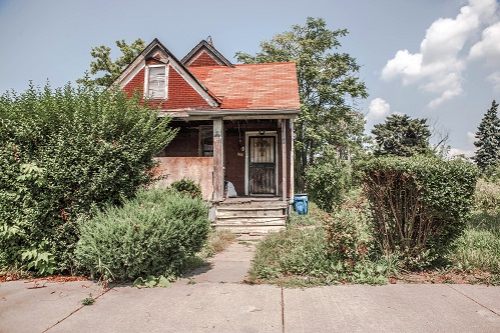- How to file a homeowners insurance claim
- How to file a homeowners insurance claim for roof damage
- How to file a homeowners insurance claim for water damage
- Filing a renters insurance claim
- What to avoid when filing a home insurance claim
- How much does homeowners insurance go up after a claim?
- What to do when homeowners insurance denies your claim
- FAQ: Home insurance claims
How to file a homeowners insurance claim
How you file your home insurance claim depends on your insurance company's procedures, but the initial steps are usually straightforward. Most insurance companies offer several options:
- Calling or visiting your insurance agent
- Calling a claims line
- Filing online
- Filing through a mobile app
If you're filing a major claim, the details of the claim are complex, or you've never filed a claim before, you should consider getting someone on the phone. An insurance representative can walk you through the process.
If the claim is the result of a natural disaster where there is widespread damage, your insurance company may have set up mobile response units in your area to assist customers. Although insurers prepare with additional staff after a major disaster, it may still take time to get through.
When you file your claim, you should be prepared to provide:
- Your policy number or other identifying information to help the representative locate your policy.
- A description of what happened
- Photographs of the damage, if you are filing online or via a mobile app
- A police report number, if appropriate
Once the initial claim has been filed, you'll be contacted by an adjuster to take the next steps.
How to file a homeowners insurance claim for roof damage
A claim for roof damage is much the same as any other claim, although in this case you may not have seen the damage yourself unless you have been up on the roof.
However, be aware that your insurance company will carefully review the condition of your roof before making payment. Many insurers point to exclusions spelled out in a typical policy, including wear and tear, deterioration, faulty defect or design, neglect, and pre-existing damage.
"You have to show a covered peril caused the damage that allowed water to enter your home, such as a hail strike, roof tiles lifted in extreme winds, a tree branch falling, or a lightning strike," says Nicole Shacket, supervising attorney for Insurance Litigation Group in Miami.
If a covered peril causes damage to your roof, "you can contact your insurance company and file a claim. Then, the insurer will send an adjuster to your property to inspect the damages," Shacket says. "They may also request documentation, pictures, a recorded statement from you, an examination under oath, or a reinspection before they make repairs or replacements."
How to file a homeowners insurance claim for water damage
While a water damage claim may follow the standard procedure, the coverage depends on how the water damage happened.
"Standard homeowners insurance provides coverage for burst pipes, wind-driven rain and damage resulting from ice dams on your roof. Some policies also cover sewer and drain backups, but many do not," says Loretta Worters, vice president of media relations for the Insurance Information Institute. "In general, water that comes from the top down - such as rainfall - is covered by a standard policy. Water that comes from the bottom up, such as an overflowing river, is covered by a separate flood insurance policy."
Additionally, your water damage claim may be denied under certain circumstances, such as:
- Lack of maintenance - For example, if you had a leaky faucet and failed to repair it
- A broken pipe caused by wear and tear
- Plumbing system deterioration
- Mold, rotting or corrosion
- Foundation seepage
- Rising groundwater
"Your insurance policy may also include limits for water damage. For instance, some policies limit water damage payments to $5,000 or $10,000," Espinosa says.
Filing a renters insurance claim
Renters will file a claim in much the same way as homeowners. However, if your rental has structural damage, notify your landlord immediately. Most leases and states require that the tenant notify the landlord, who is responsible for structural repairs. Those repairs may include a leaky roof, broken window or water damage caused by a plumbing issue.
Your landlord will need to file a claim with their insurance company for damage to the building. As a renter, you will need to file a claim with your insurer for damage to your property.
If a burglary has occurred, also notify your landlord. Your landlord's insurance policy should include coverage for any damage that results from the theft, but your renters insurance will provide coverage for your personal property. If there's a burglary at your home, file a police report and document everything and submit this information to your insurer and landlord if they need to file a claim.
What to avoid when filing a home insurance claim
When filing a homeowners insurance claim, homeowners often make several errors that can delay their claim or affect their payout:
- Lack of documentation. Not having enough proof of what property was damaged or lost could delay the process or affect how much you'll receive. Consider photographing or making a video inventory of your home's contents before you have an issue and save it in a safe place. Keep copies of receipts for higher-value items. That way, you can show what you've lost if and when it happens.
- Throwing away or discarding items too soon. Document your loss with as much detail as you can, and don't throw away any evidence until you agree upon a payout.
- Waiting too long to contact your insurance company. If you act quickly, you can initiate the claims filing process and get an insurance adjuster to visit your home soon to assess the damage.
- Not completing claims forms promptly. The claims process can drag on if you don't provide your insurance company with paperwork for proof of loss, receipts and other documentation to approve your claim. Insurers usually are required to send you claim forms within 30 days, depending on state law. The longer you wait to complete these forms, the longer the process takes.
- Not understand your policy. Standard home insurance doesn't include flood coverage, which must be purchased separately through the federal government's National Flood Insurance Program. Note that NFIP policy limits are $250,000 for the property and $100,000 on the contents. So if you need more, you'll need to get excess and surplus coverage, available from some insurers.
How much does homeowners insurance go up after a claim?
The type of claim will determine how much your home insurance rate goes up. Fire claims see the biggest increase, while weather claims are the smallest. The average rate increases for home insurance claims are as follows.
| Claim type | Average % increase | Average % increase for two claims |
|---|---|---|
| Fire | 29% | 60% |
| Theft | 27% | 55% |
| Liability | 25% | 52% |
| Water | 25% | 50% |
| Medical | 18% | 34% |
| Weather | 16% | 29% |
What to do when homeowners insurance denies your claim
If your homeowners claim is denied or the settlement is too low, you have options.
The first step is to file an appeal with your insurance company; every company has a process for this. If you can't agree, you can file a complaint with your state's insurance department, file a claim in small claims court or file a lawsuit against your insurance company.
FAQ: Home insurance claims
Can you keep home insurance claim money?
Technically, if you are paid for a claim by your insurance company, you aren't required to spend the money on repairs, remediation or replacement if you own your home outright. But if you pay a mortgage, your lender may require you to use the money to fix or rebuild your home. The lender may even hold funds until they see proof of work being done.
Even if you own your home outright or your lender doesn't obligate you to use the claim payout for repairs, think twice before pocketing the money.
"Say you choose to take the claims money, not repair the damage and instead buy a car, for example. If so, your insurance company has every right to amend your policy, exclude damaged property they've already paid out for or even cancel or non-renew the policy altogether. If you do elect to keep the funds and not make repairs, the replacement cost clause becomes null and void," says Ben Galbreath, producer and independent insurance agent with Wallace & Turner Insurance in Springfield, Ohio. "When you sign the application for a standard homeowners insurance policy, you are agreeing to transfer the risk of financial loss to repair or replace any damage to your home and put it back to its original status before the loss or better."
How long does a home insurance claim stay on your record?
Typically, an insurance claim related to a recorded loss remains on your record for three to seven years. If you file one or more claims within this period, your premiums may increase or you could be excluded from coverage.
"Insurance companies tend to look at the frequency and severity of claims. If there is a high frequency - meaning high number of claims - they may increase your deductible, force you to purchase specific coverage elsewhere, change the way losses are evaluated from replacement cost to actual cash value, or cancel your policy entirely," Galbreath says.




